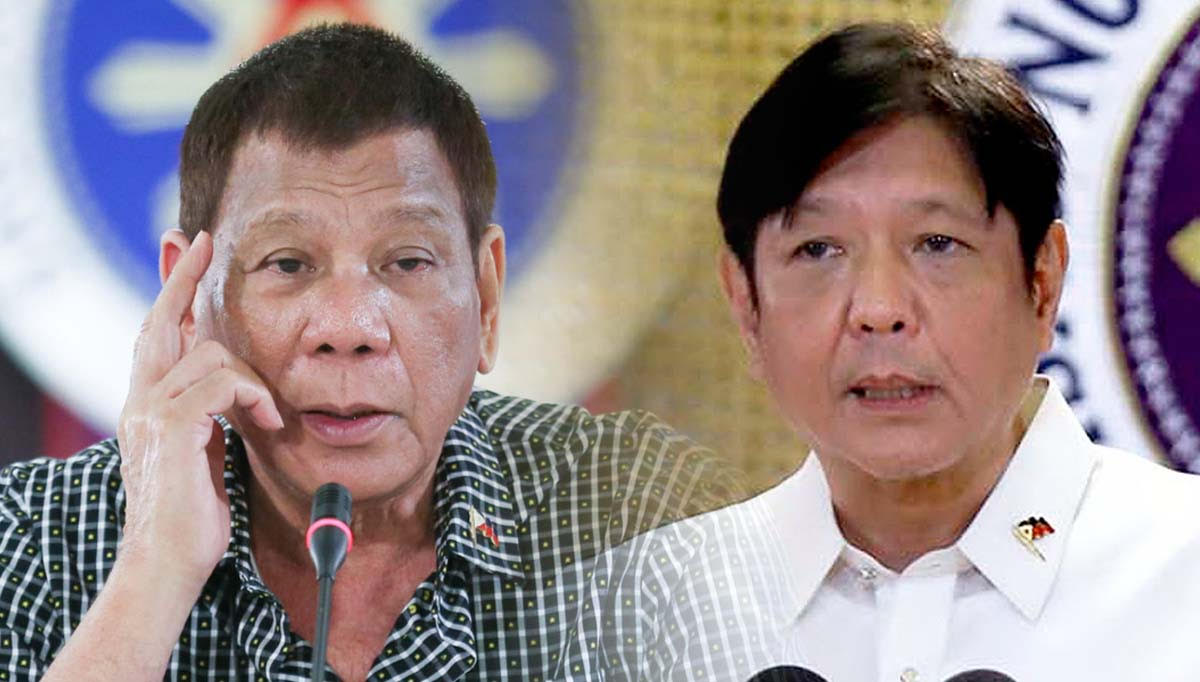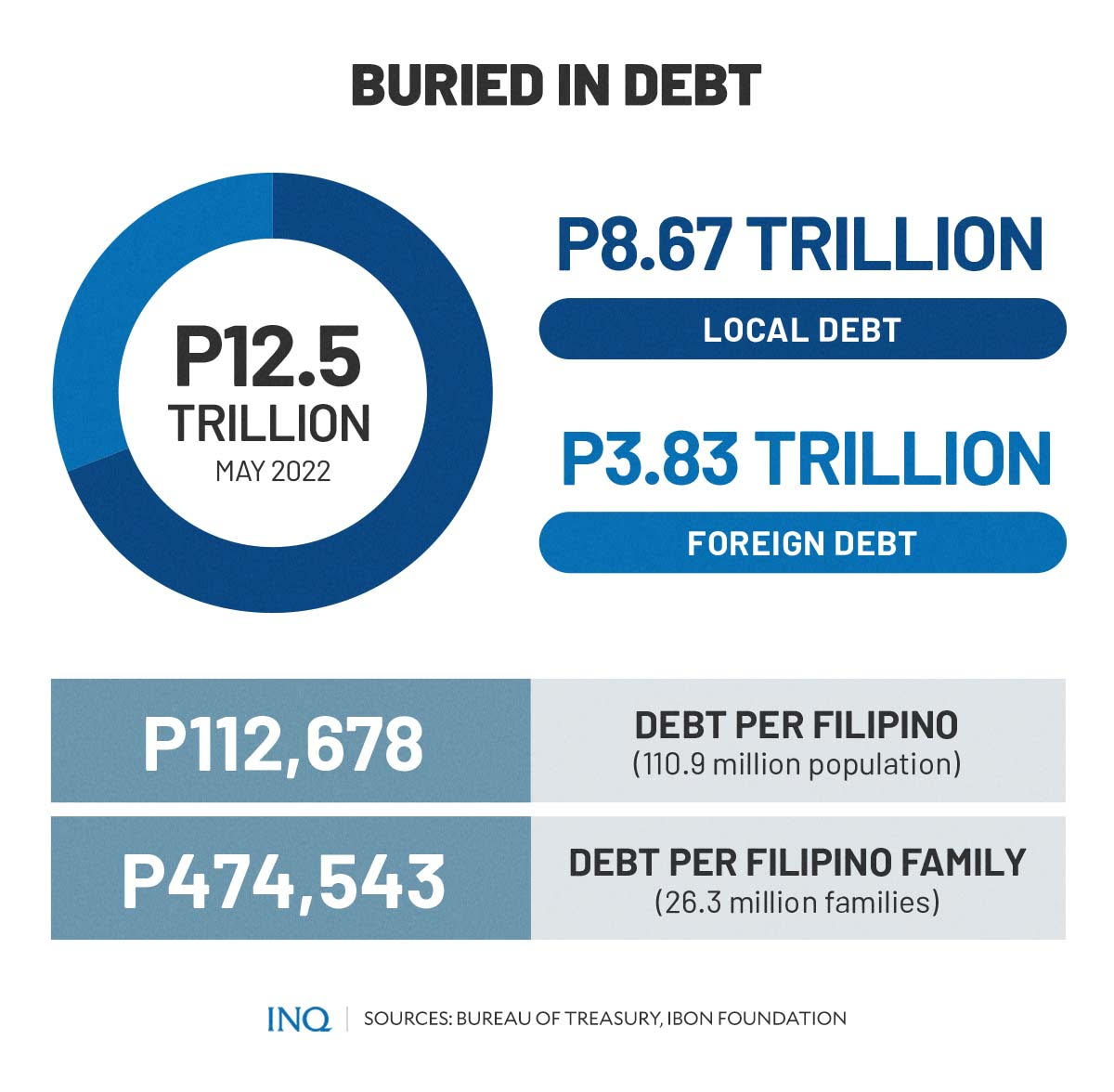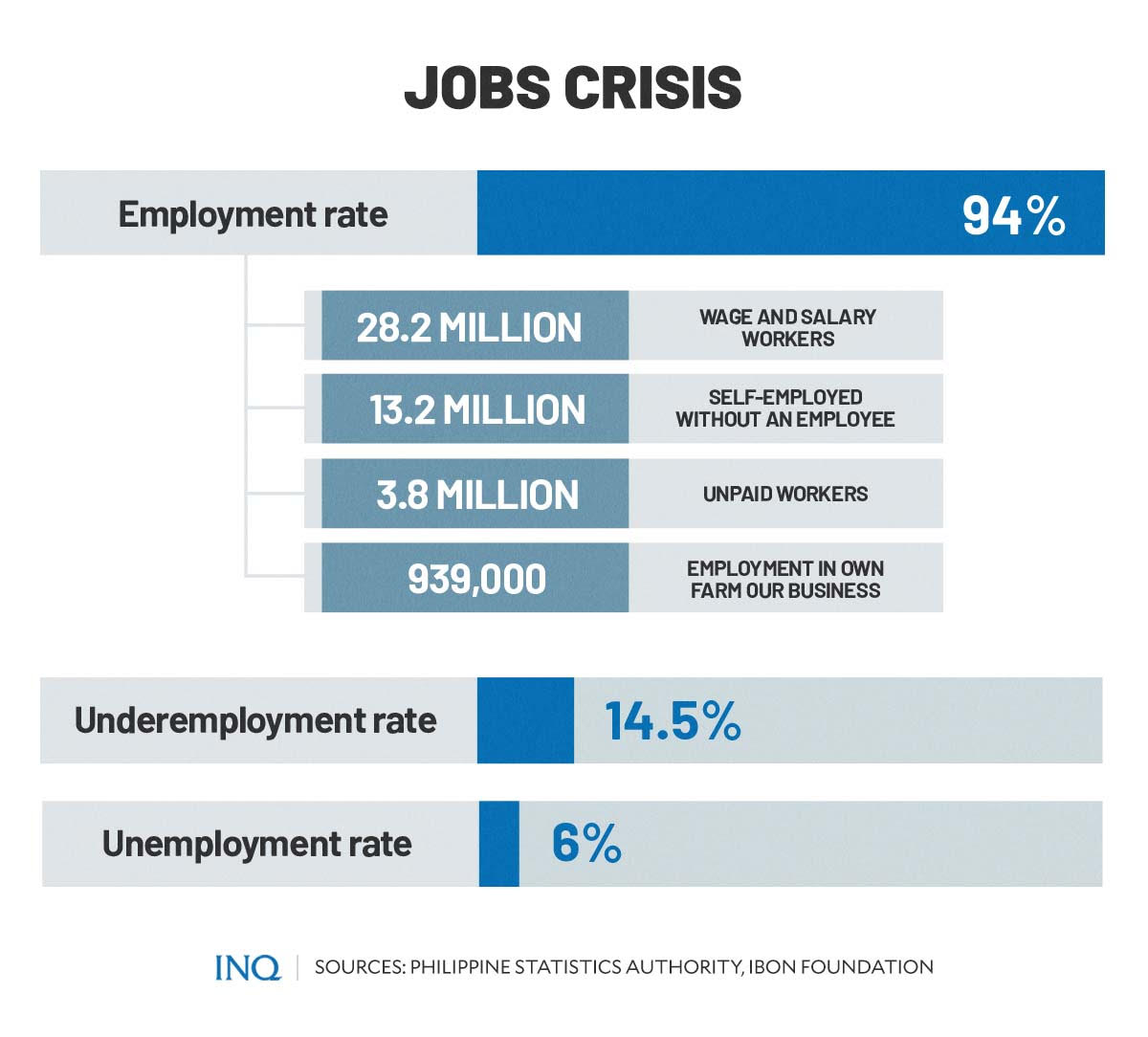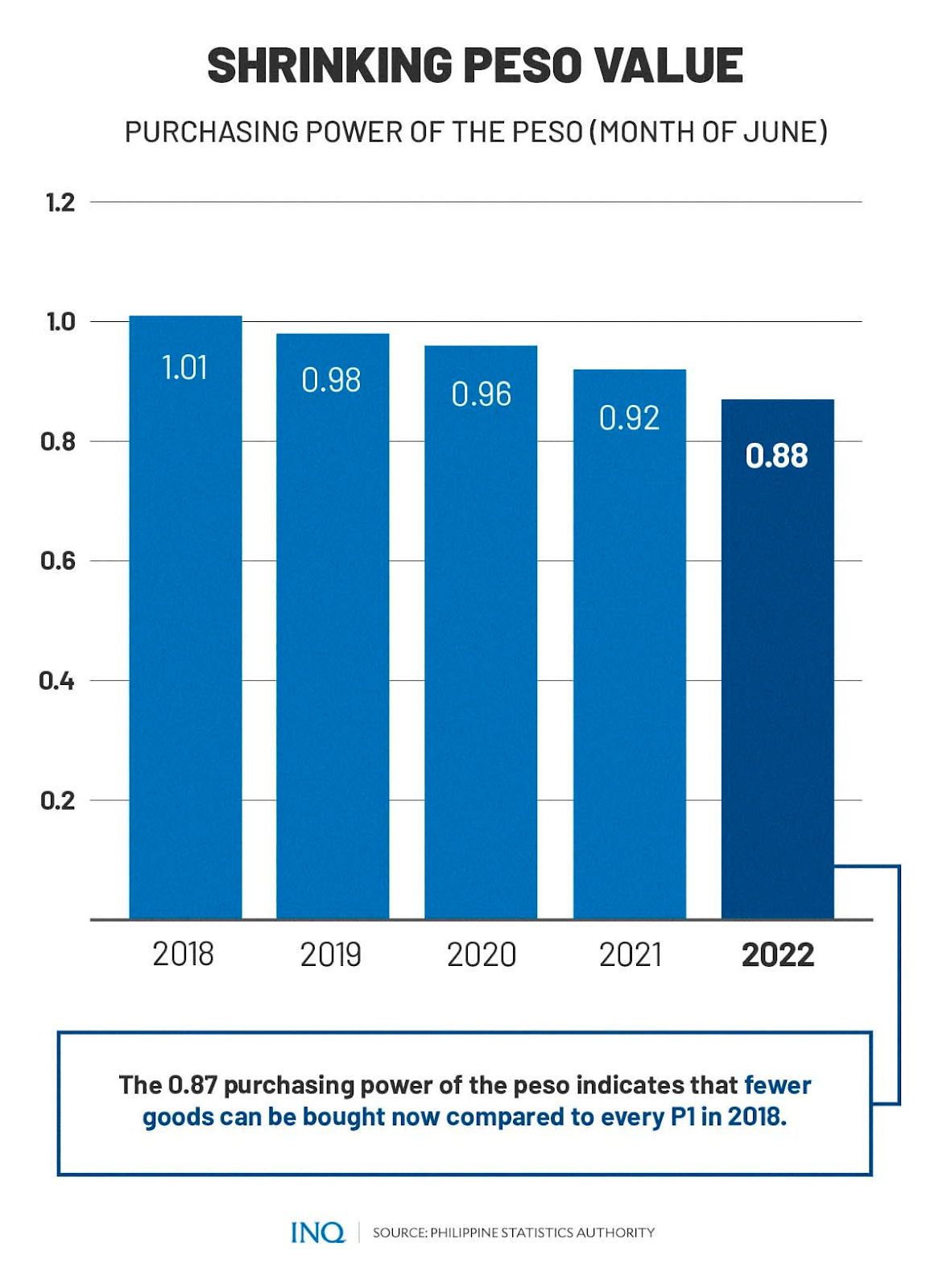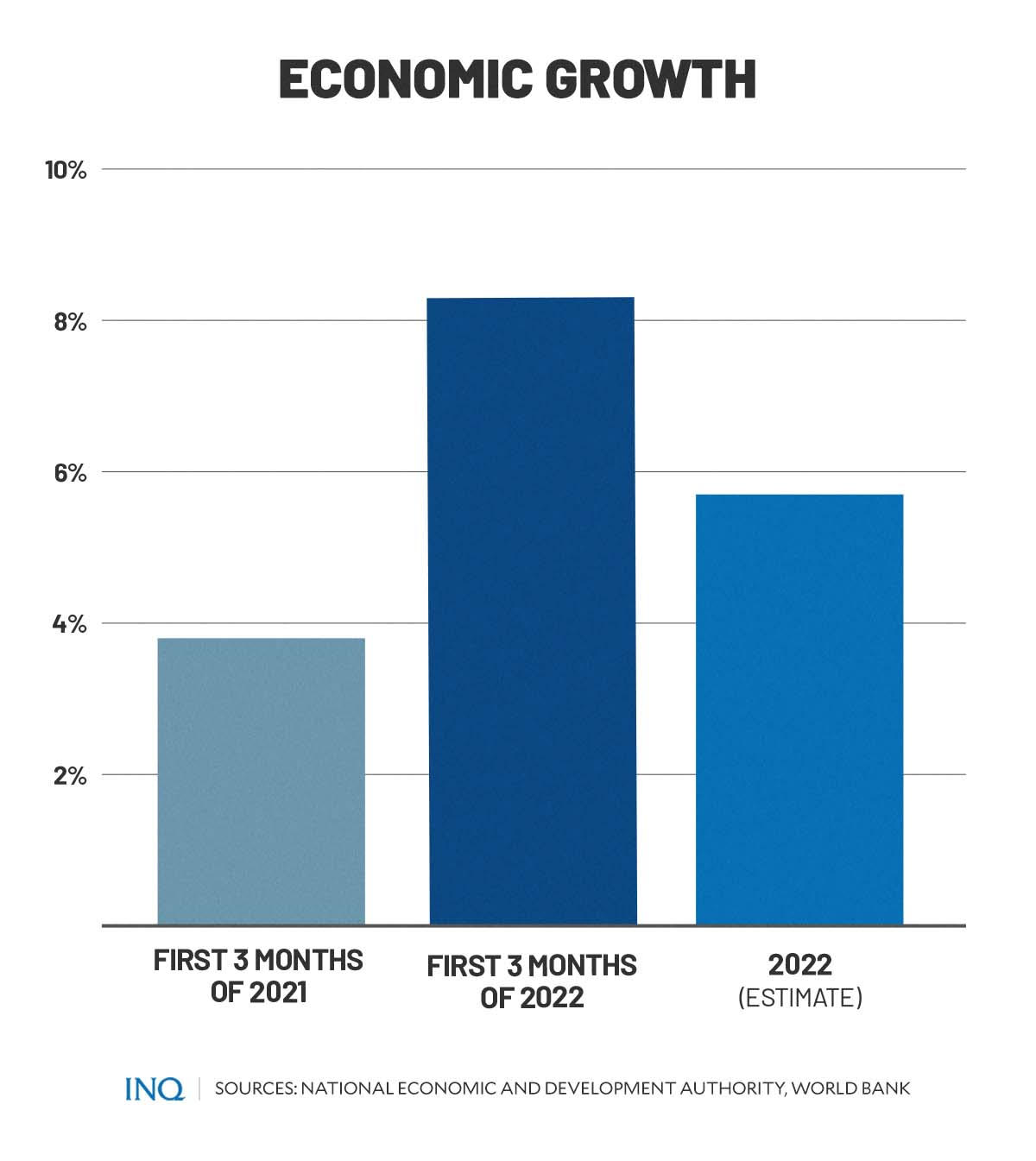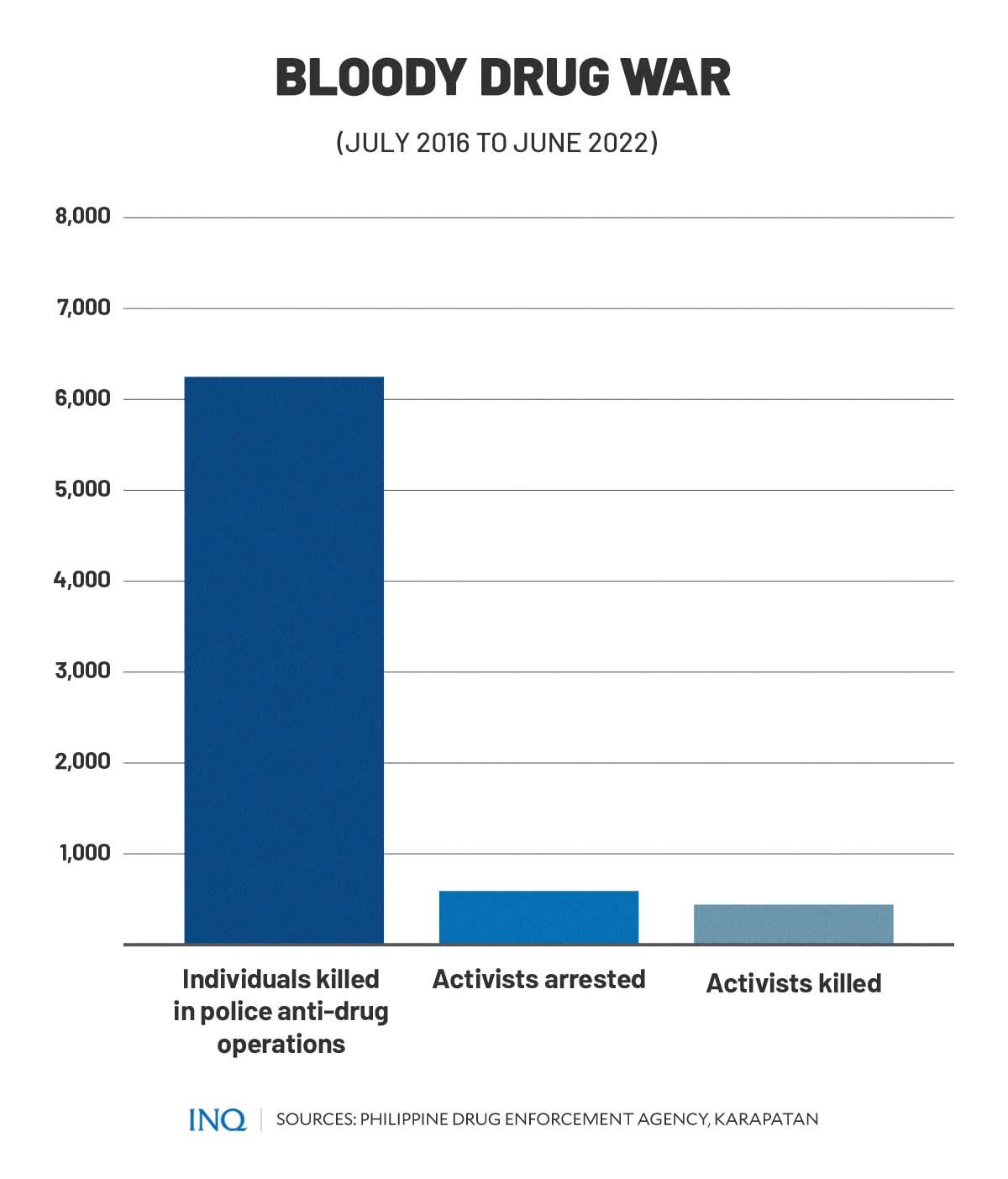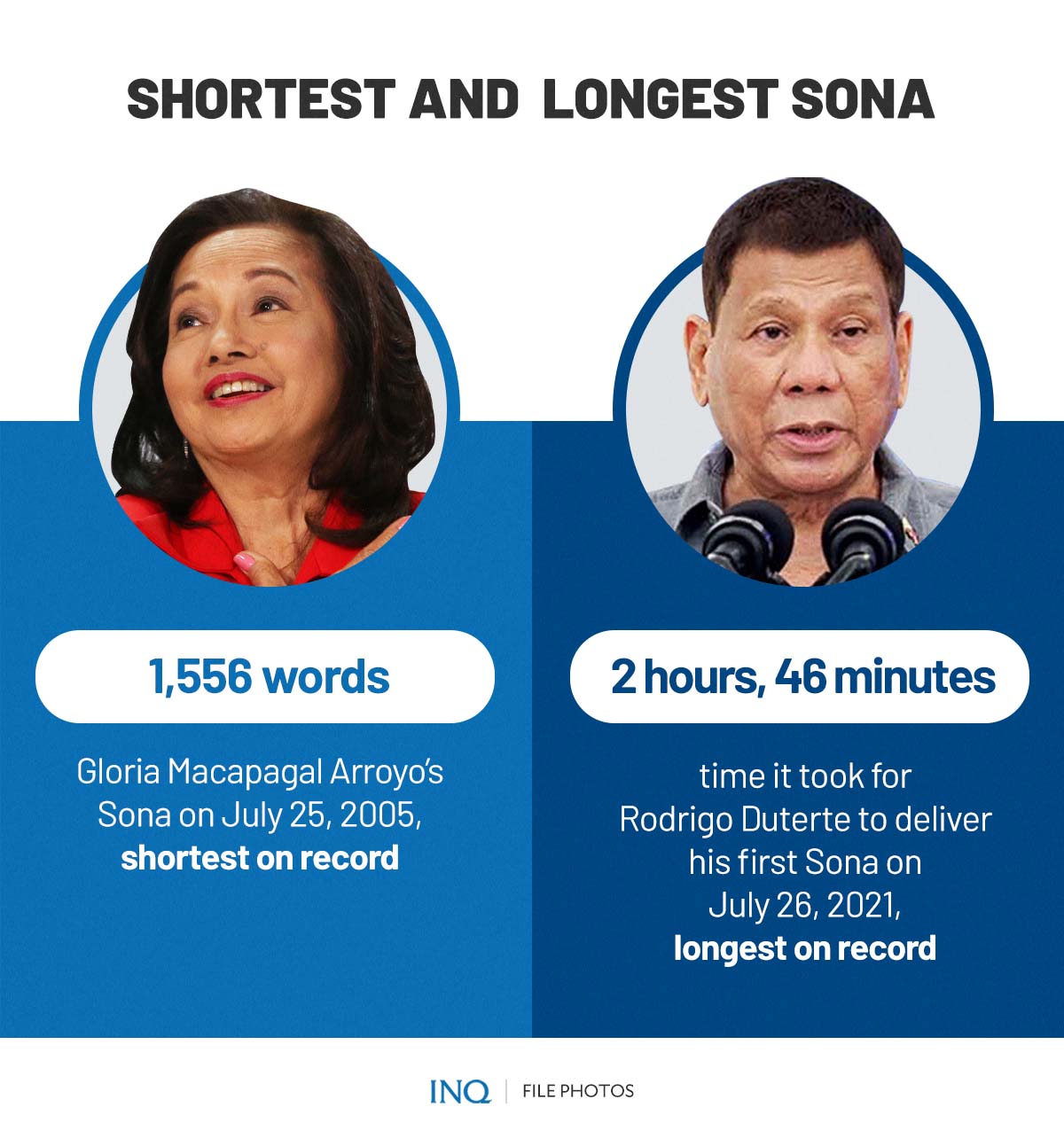Bongbong Marcos’ 1st Sona: Inheriting Duterte problems, plotting solutions
MANILA, Philippines—Rodrigo Duterte’s six-year presidency ended, leaving behind problems that the local think tank Ibon Foundation said should be “heavily discussed” by Duterte’s successor, Ferdinand “Bongbong” Marcos Jr., in his first State of the Nation Address (Sona).
Executive Secretary Vic Rodriguez said on Friday (July 22), that Marcos’ speech will be about concerns that he and his Cabinet have discussed, as well as government plans for COVID-19 response and economic recovery.
READ: Bongbong Marcos still ‘very busy’ writing his Sona speech, says ES Rodriguez
Rodriguez stressed that Marcos is the one writing his Sona, devoting the weekend to finalizing the address, which would have been delivered at Batasang Pambansa in Quezon City, home of the House of Representatives.
Ibon Foundation executive director Sonny Africa told INQUIRER.net that “many social and economic measures can and will be discussed, such as for economic relief, health, education, and agricultural development.”
This, as he stressed that problems, like joblessness and inflation, indicate the “deteriorated state that the Duterte administration has left the economy in, and which the Marcos government should seriously address.”
- PH debt hits P12.5 trillion in May
The government’s outstanding debt slightly eased to P12.5 trillion in May, the Bureau of Treasury (BTr) said, stressing that the latest debt stock, which represented a 12.9 percent annual growth, slipped from P12.76 trillion in April.
The BTr said the month-on-month decline was mainly because of the settlement of P300 billion in provisional advances from the Bangko Sentral ng Pilipinas, a month before the June deadline to pay.
However, Ibon Foundation stressed that P12.5 trillion, considering that there are 110.9 million Filipinos and 26.3 million families, means a P112,678 debt per Filipino and a P474,543 debt per family.
Local debt, which is 69.3 percent of the total, eased to P8.67 trillion from P8.93 trillion in April, while foreign debt, which is 30.7 percent of the total, hit P3.83 trillion, 0.1 percent higher than April’s.
- Joblessness, informal work worsen
The Philippine Statistics Authority (PSA) said last July 7 that six percent, or 2.93 million Filipinos were jobless in May, slightly higher than the 5.7 percent, or 2.76 million jobless Filipinos in April.
It said the employment rate was 94 percent, or 46.08 million of the 49.01 million Filipinos in the workforce who are 15 years or older. The underemployment rate, however, rose to 14.5 percent in May from 14 percent in April.
Ibon Foundation said the latest PSA data indicate that the Philippines has the “worst” unemployment rate in Southeast Asia, saying that six percent is higher than Indonesia’s 5.8 percent and Malaysia’s 3.9 percent.
It said while there were 28.9 million Filipinos who worked for 40 hours and more in May, 16.7 million worked for only less than 40 hours and 500,000 had a job, but not at work.
Breaking down the 46.08 million employed Filipinos, 13.2 million were self-employed without an employee, 939,000 were employed in own farm or business, 3.8 million were unpaid family workers, and 28.2 million were wage and salary workers.
- High inflation
The Philippines’ inflation rate hit 6.1 percent in June, the highest since the rice crisis in October 2018, when the inflation rate was 6.9 percent, the PSA said, stressing that the value of P1 eroded to P0.87—the lowest to date.
READ: High inflation: Your P1 is now worth only 87 centavos
BSP Governor Felipe Medalla said consumer prices will “in all likelihood” exceed the government’s target this year and take “many months” to sink back to the level deemed manageable and conducive for economic growth.
National Statistician Dennis Mapa stressed that based on data from the ground, prices “will still move upward” in the coming months, saying that “it’s a very steep slope every month.” Back in 2018, the inflation rate hit 6.6 percent in August and 6.9 percent in September and October.
For Ibon Foundation’s Africa, the inflation rate will keep rising as high fuel prices and the shrinking peso still work their way through the system: “It does not look like the global factors for these will subside anytime soon.”
The PSA said that the high inflation rate in June was brought by a higher annual growth rate in the prices of food and non-alcoholic beverages, which saw a rise from 4.9 percent in May to six percent in June.
- Economic recovery for all?
The National Economic and Development Authority (Neda) stressed in May that as the government “managed” risks posed by COVID-19, the economy grew by 8.3 percent year-on-year in the first three months of 2022.
“This is a significant reversal from the 3.8 percent contraction in the same period last year. We have surpassed the pre-pandemic gross domestic product level,” said Duterte’s economic managers.
World Bank said last June 8 that the Philippine economy will likely grow 5.7 percent this year, one of the highest in Southeast Asia, however, with high inflation, government debt, and external reasons, not everyone will feel the economic recovery.
World Bank’s Ndiame Diop said these reasons include the geopolitical uncertainty brought by Russia’s invasion of Ukraine, tightening global financial conditions, and weakening growth of the Philippines’ traditional trading partners.
Last June, Ibon Foundation said that while the government claimed that the economy is on its way to recovery, the over one million drop in employed Filipinos in April confirms that economic recovery is “stumbling”.
“The jobs crisis and inflation have worsened due to the lack of production sectors that can provide steady employment and incomes and deliver the requirements for national development,” Ibon Foundation said.
It stressed that “the recent hyped rapid growth is clearly not creating enough jobs and the jobless growth from before the pandemic is reasserting itself in a worse way after the harsh and over-long lockdowns.”
- Poverty, hunger
Polling by Social Weather Stations (SWS) revealed that 10.9 million Filipino families considered themselves “poor” in the first three months of 2022—43 percent were “poor,” 34 percent were “borderline poor,” while 23 percent were “not poor.”
READ: 10.9M Filipino families felt ‘poor’ in Q1 of 2022 – SWS survey
SWS explained that the steady self-rated poverty between December 2021 (10.7 million) and April 2022 (10.9 million), was because of the increases in Mindanao and Metro Manila, combined with decreases in the Visayas and Balance Luzon.
Neda earlier said that in 2015, poverty was estimated at 23.5 percent and that in 2018, the government had reduced it to 16.7 percent, saying that “before the pandemic, we were very much on track to achieving 14 percent or less.”
Duterte’s economic managers said last April that the goal to reduce the poverty rate is still within reach despite the prolonged COVID-19 crisis and the indirect effect of Russia’s invasion of Ukraine.
However, World Bank warned that high food and fuel prices may increase the number of poor Filipinos, saying that its simulation indicated that for every 10 percent increase in food prices, at least one million Filipinos would be added to the poverty headcount.
READ: Dominguez: 2022 poverty reduction target still achievable despite rising inflation
This, as the number of Filipinos who experienced hunger likewise hit 3.1 million families, slightly higher than three million in December 2021 and 2.5 million in September 2021.
READ: 3.1 million Filipino families experienced hunger in Q1 of 2022 – SWS
- ICC investigation on drug war killings
Last month, International Criminal Court (ICC) prosecutor Karim Khan said he would seek to reopen an investigation into the killings and rights violations allegedly committed by the Duterte administration in the war on illegal drugs.
He said that after a review of all the information available publicly, “I have concluded that the deferral requested by the Philippines is not warranted, and that the investigation should resume as quickly as possible.”
Based on data from the Philippine Drug Enforcement Agency, as of April 30, 6,248 drug suspects had been killed in the government’s war—deaths, which rights groups said, could exceed 30,000.
Last July 4, the Manlaban sa EJK, an alliance of lawyers, judges, legal practitioners and law students, said Marcos should cooperate with the ICC investigation, saying that this would achieve a “high level of accountability.”
However, in January this year, Marcos said he will bar ICC prosecutors from coming to the Philippines and investigate the allegations of crimes against humanity against Duterte, father of Vice President Sara Duterte.
READ: Marcos to bar ICC prosecutors if elected
“We have a functioning judiciary, and that’s why I don’t see the need for a foreigner to come and do the job for us, do the job for our judicial system. Our judicial system is perfectly capable of doing that,” he said.
- War on Reds
In 2019, Duterte said that he considered communist rebels as his “friends,” saying that he was able to establish good relations with them and that he could not be harsh in dealing with them.
As mayor of Davao City, Duterte had, indeed, been able to win the trust of communist rebels, enough for the rebels to allow him to take center stage in the release of rebel captives.
However, Duterte’s public posture toward the rebels turned into attrition when he ended peace talks with National Democratic Front of the Philippines (NDFP), the umbrella organization of underground rebel groups including Communist Party of the Philippines (CPP) and its armed wing, New People’s Army.
READ: Breaking the promise of peace, Duterte turns from rebel ‘friend’ to worst foe
Duterte’s next step cemented his angered policy toward the rebels—he designated non-combatant peace consultants of NDFP as terrorists.
CPP founder Joma Sison said last month that the NDF was always open to negotiations with the government whoever is president, stressing that if the Marcos administration was willing to talk, “why not?”
National Security Adviser Clarita Carlos said last July 15 that the future of the stalled peace talks between the government and communist rebels lies at the hands of Marcos, stressing that “for now, the government will continue with its local engagement.”
Duterte’s insurgency war, which was tainted by “dangerous” red-tagging, already saw 442 activists killed and 591 activists arrested since July 1, 2016, the first day of Duterte’s six year presidency.
RELATED STORY: ‘I don’t care about human rights’: Duterte and the failure to see human rights’ role in progress
- West PH Sea rights
Last month, former Supreme Court Senior Associate Justice Antonio Carpio asked Marcos to prove his commitment to assert the Philippines’ sovereignty in the West Philippine Sea.
“I was pleasantly surprised that the president-elect said that we will assert the arbitral award – that we will not give up an inch, a single millimeter of our sovereign rights, our sovereignty in the West Philippine Sea. That’s music to my ears,” Carpio told One News.
“But we have to watch the president-elect if he will walk the talk […] What he will actually do on the ground, on the water. That’s a good initial step that sets the tone and we’re happy with that,” said Carpio in the interview that was conducted before Marcos took his oath of office as the Philippines’ 17th president.
The Pambansang Lakas ng Mamamalakaya ng Pilipinas (Pamalakaya), a fisherman’s group, also said it expected Marcos to discuss plans to assert sovereign rights in the West Philippine Sea, empower local fisheries production, and protect coastal communities.
This, as Duterte, in his six-year presidency, had been heavily criticized for his policy on China’s aggression in the West Philippine Sea. In one instance, he described the Philippines’ legal victory against China as a “worthless piece of paper.”
READ: Why do China, Duterte descriptions of arbitral ruling look the same?
That piece of paper that Duterte referred to was the Philippine victory on July 12, 2016 in the Permanent Court of Arbitration, which ruled that the Philippines has exclusive sovereign rights over the West Philippine Sea and China’s nine-dash line invention has no legal basis.
- Excessive importation
The government was clear—the rice liberalization law (RTL), which took effect in 2019, is the “best model that we have to help both farmers and consumers,” but the group Federation of Free Farmers (FFF) took a close look and it was not so.
READ: Rice imports: Group says PH farmers, consumers both lose
Republic Act No. 11203, which was signed by Duterte in 2019, replaced quantitative restrictions—a ceiling on volume—on imported rice with tariffs of 35 to 40 percent. As a result, commercial traders could now bring in unlimited volumes of rice at any time.
As Marcos is set to deliver his first Sona, agricultural groups expressed hope that he will lay out an agricultural plan, saying that while the President already said that he wanted domestic production instead of importation, there should be a concrete plan.
RELATED STORY: Imports’ continuing impact on PH farmers: Like dislocating the kneecaps
FFF earlier said that the assertion that RTL reduced rice-based inflation is “highly misleading,” saying that zero inflation in rice merely meant that prices have not changed relative to a previous period.
It said “this is just one side of the picture,” stressing that the RTL opened up the domestic market to excessive imports and precipitated a severe fall in palay prices, causing P66 billion in losses to farmers.
Based on data from the PSA, between 2019 and 2021, the gross value of palay production (including harvests kept by farmers for family consumption) decreased by P92 billion.
- Way out
Marcos’ Sona will be a chance for him to highlight his plans for the next six years of his presidency, especially because the risks of COVID-19 and its possible effect on the economy is still lurking.
“It’s all about our economy, the economic plans, the face-to-face opening of this coming school year. It’s all about COVID-19 response and when we say COVID-19 response, it goes all the way to the entire cycle of economy, not just health,” said Rodriguez, Marcos’ executive secretary.
Marcos, who likewise serves as agriculture secretary, is expected to discuss the issue of food security, said Rodriguez, stressing that “It is his thrust, it is his vision for us not only to have food security but food sovereignty.”
“If we can feed ourselves as a nation, if we can feed ourselves as Filipinos, I think we are on our way to where we want to be much like where our neighbors are,” Rodriguez said.
Rodriguez said Marcos also wants to push for digitalized governance: “Very much related to COVID-19 response and opening of classes is of course the digitalization, not just with respect to the education of the students but also with the way things are being run in terms of governance.”
While Marcos was expected to lay out a blueprint, Ibon Foundation’s Africa said the most important thing to watch out for when Marcos delivers his address is whether he will commit meaningful resources to grandiose plans.
“Nice-sounding proposals will be mere public relations tokenism if he doesn’t announce major budget realignments for these in the remaining months of the year. Likewise, an austerity budget with just a 4.9 percent increase in 2023 will belie promises to help Filipinos and spur recovery. This small increase doesn’t even keep up with inflation already at 6.1 percent in June,” he said.
“If the Sona doesn’t signal a bold expansionary fiscal policy—and, worse, still prioritizes infrastructure and debt service—the difficulties of millions of job-starved families will continue and even economic growth will slow.”
- Marcos’ Sona
Marcos was scheduled to deliver his first Sona at 4 p.m. on Monday (July 25), with 70 percent of 1,360 invitees intending to come. “It’s very simple and traditional,” the House of Representatives said.
READ: ‘Simple, traditional’ SONA with 1,300 guests, director
Former presidents Joseph Estrada and Gloria Macapagal-Arroyo have confirmed attendance, and so have members of the diplomatic corps, Mark Mendoza, the House secretary-general said. But Arroyo had tested positive for COVID and would have to skip the Sona.
Vice President Sara Duterte will also be there in person for Marcos’ first Sona. Yet to confirm attendance, as of this writing, were former presidents Rodrigo Duterte and Fidel Ramos and former vice president Leni Robredo.
Article 7, Section 23 of the 1987 Constitution requires the President to “address the Congress at the opening of its regular session”. The President delivers the Sona every year, usually held every last Monday of July.
This, as the president is expected to report the state of the nation, reveal the administration’s agenda for the coming year, and ask Congress to pass priority legislative bills.
Rodriguez said that Marcos’ address is still a “work in progress” on Friday (July 22) and it was still too early to say how many pages the prepared speech would be. The event would be directed by Paul Soriano, husband of actress Toni Gonzaga, who had hosted Marcos’ campaign rallies.
Based on records, it was Arroyo who delivered the shortest address on July 25, 2005, a 1,556-word speech, while Duterte was the one who delivered the longest post-Edsa speech, which lasted for two hours and 46 minutes on July 26, 2021.
